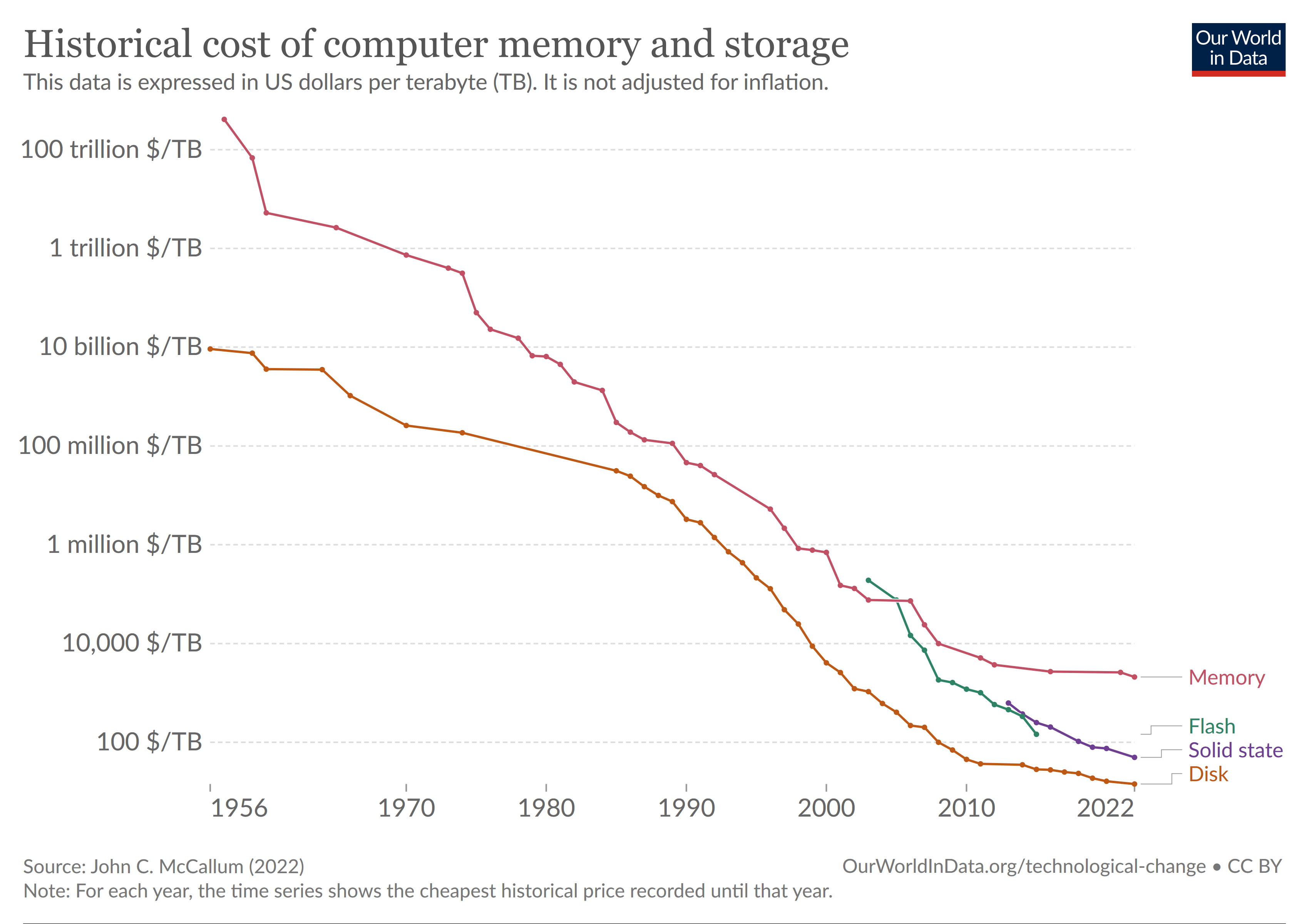There are already 2TB SSDs available for less than 80€ and prices are expected to go even lower.
I agree with Artic Mine and believe storage is not going to be a problem for Monero and that the only real bottleneck is upload speed.
What do you think?
Anyone tight on space can just prune their node and get another 5 years out of the same space. By the time monero is 1tb people will have 20tb in their phones.
Technology will keep improving, but I don’t think Monero scaling should allow a long-term increase that’s on the optimistic side of these projections.
Bitcoin clearly still works and has demand despite the limited block size, so Monero should grow more conservatively than it currently does after it permits as many transactions per hour as Bitcoin.
I see the dynamic size as a downward pressure against high fees. I don’t see high fees at peak times as a failure, like some people see them.
It is a failure, mastercard does not have higher fees at peak times. Do you know why, because people would not use their service if they did.
At peak times fees should go down if anything. More transactions = more rewards for miners thus fee per TX should go down. This is how a functioning blockchain handles fees. Bitcoin is broken.
Sadly, you can only guarantee that fees will stay at the same amount (or drop in your example) if we assume infinite scaling. Suppose 10 TB of transaction data shows up and wants to be mined into the next block. Fees only stay at the same value if you widen the block size to 10 TB. If you didn’t, then some people would be willing to pay more than others to get into the next block.
That is why it is critical for Monero to keep innovating, if we are able to keep reducing TX size, keep bloat away from the chain (NFT, and other crap), and incorporate better pruning techniques there should be no issues with accommodating any realistic volume that will happen. Highly doubt a block will get to 10MB in the next 10 years much less 10TB.
I checked the costs of drives today at my local shop. At 1TB NVMe SSDs are cheaper than HDDs and surprisingly cheaper than the 2.5" SSDs I still hear people complain that SSDs are too expensive
Yeah, at some point SSDs get so cheap that HDDs are more expensive just because they require more raw materials.
@monerobull What if someone doesn’t have 80€ ? By raising the cost of running a node you cut off the very demographic you’re supposed to serve.
The chain is currently 170 GB, people who can store it now will be able to store it at the same price or most likely way cheaper than what their 256 GB SSD costed many years from now when the chain is 10 times bigger. If 2 TB SSDs are halving in price every 1-2 years, smaller SSDs that are already cheap become cheaper too.
@monerobull The current size of the chain is already unacceptable for most users (even after pruning). People are not going to buy new hardware to accommodate a growing chain, they’ll switch to centralized providers.
Also, I think it’s reasonable to assume that everyone will be getting poorer in the coming years.The current size of the chain is already unacceptable for most users (even after pruning)
That’s just not true. Have a look at this chart. People still get the newest one every year:
 >
>People also need to stop thinking that running a proper global payment network can work only on raspberry pis and 500kb internet.
they’ll switch to centralized providers
Good thing that with the improvements to lightwallets you’ll only need to have 1 person in your social circle that you somewhat trust running a node.
>People also need to stop thinking that running a proper global payment network can work only on raspberry pis and 500kb internet.
It’s the only way to run a truly global network. Otherwise you’ll get a cluster of nodes controlled by a tiny oligarchy. That’s what happened to Ethereum, where “this is fine” and “hardware is getting cheaper” narratives were also dominant.
>Good thing that with the improvements to lightwallets you’ll only need to have 1 person in your social circle that you somewhat trust running a node.
Even Bitcoin, where the chain can be pruned to a couple of gigabytes, has only ~16500 active nodes, and the number is not growing anymore. That’s one node per ~400000 people.
The cost of running a node needs to be comparable to the cost of running ActivityPub server. Only then node-sharing might become prevalent.
Hosting this server is more expensive than my Monero full node since I already have a PC and got a used 25€ 500GB SSD just for the node. I doubt cost of hardware is actually the main reason why people don’t run nodes. The biggest reason would be that they simply don’t have a PC they can leave on all the time or are on limited data plans and downloading anything above a few GB would mean they don’t have internet for the rest of the month. My whole point is just that storage is not this massive bottleneck bitcoiners make it out to be, there are others that are way bigger.
@silverpill @monerobull
its interesting reading the responses in this thread. There are too many root assumptions in this generation which are not rooted in an awareness of reality… only what has been for the last 10 years. Which is an absolutely ridiculous way to view the world.
Stop assuming that comsumer technology will keep growing at the rate is has the last 10 years.
It wont.
In fact, ossification is already occurring, and you dont understand the cycles of history.@silverpill@mitra.social is correct to want efficiency which doesn’t rely on the collapsing economies of continual growth.
Stop assuming that comsumer technology will keep growing at the rate is has the last 10 years.
It wont.
We have like 70 years of data. People literally call the assumption of IT-stuff getting cheaper “laws”.

@monerobull @monero
There are three kinds of lies.
Lies, damn lies, and statistics.
What will your ego chart mean when our time of enjoying the global reserve currency comes to an end, and China takes back taiwan? Or when the BRICS alliance becomes the dominant economic force in the world, and the dollar experiences hyperinflation as all the stored dollars in South America and Africa come rushing back Stateside?
Youre a Roman standing on Hadrians Wall thinking the Empire will last forever.
The post WW1 growth/debt economy is headed toward a cliff along with your charts.Alright, if your expected scenario is that bleak, sure, we should try our best to keep the chain as storage efficient as possible but even if Taiwan and China stop supplying SSDs there are still quite a few manufacturers outside of those two countries and your bigger concern should be regarding CPU / other components.
@monerobull @monero
Fair enough.
My concern is the tendency to build freedom preserving technology in a way that presumes the economic bubble of the last 70 years will continue. Especially considering the geo-political state of the world, and the patterns of history.
And I am not sure that it will be a sudden and rapid collapse. In fact I doubt it.
But things are changing, and the economy we have enjoyed due to a post WW2 bubble, is ending. And we dont produce enough of our own stuff. We need to be wise. If i see a production chain from material supply, to end product, that has resilience to shifting geopolitics, Ill ease up on resource efficiency.see a production chain from material supply, to end product
yeah that would be cool.
i love it so much when americans think the usa is the only country and the usd is the only currency in the world
I wonder if the monero blockchain could be made with more sequential reads and writes than random reads and rights in order to increase storage speeds. Maybe that is already happening?
more sequential reads and writes
That mainly speeds up syncing for HDDs right? I am not sure but I think the nature of the blockchain might make sequential reading and writing impossible.
It seems to help on SSDs, just not as much
The point you made about it being impossible due to the nature of the blockchain is probably right,. Sequential writes might be possible because you don’t edit the previous parts of the blockchain, sequential reads wouldn’t work because you need to read the past of the blockchain in order to verify transactions







